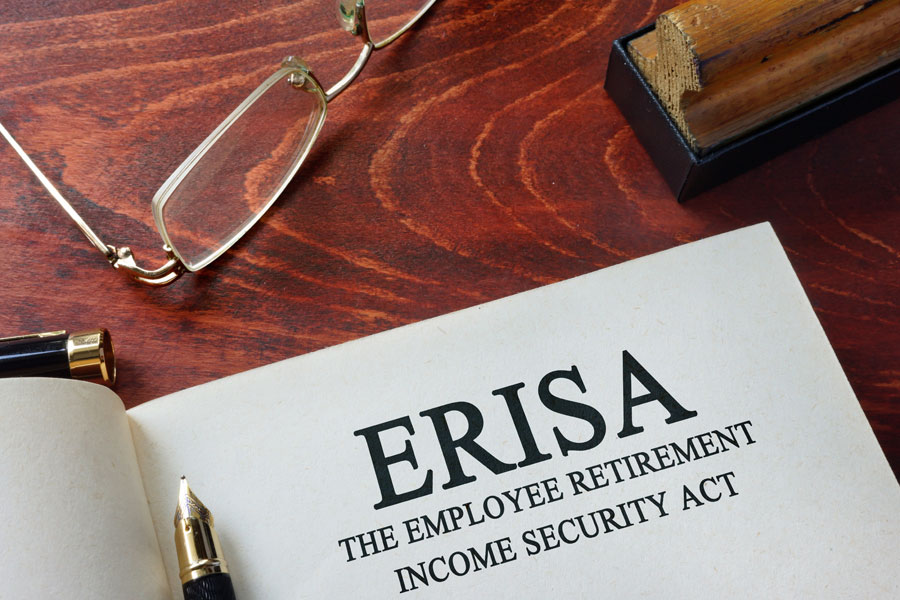ERISA vs Non-ERISA: An Important Distinction
The Employment Retirement Income Security Act (ERISA) was enacted to set standards for private-sector employee benefit plans. Employee benefits plans provide retirement benefits, life insurance and health insurance, but many people encounter the ERISA law when applying for disability payments or appealing a wrongfully denied or terminated claim.
It is critical that your understand the key differences between ERISA and non-ERISA disability plans in Florida.
Put simply, recognizing the distinctions between the two can greatly impact your rights. While certain rights exist even if you don’t know about them, you’re unlikely to exercise them without this knowledge. More importantly, disability insurance carriers may be tempted to test the limits of ERISA law (US LABOR LAW?) when dealing with policyholders who don’t know what they’re entitled to. Don’t fall into this trap.
Understanding the key differences between Florida ERISA and non-ERISA disability plans can also make a huge difference.
Relevant Regulation
The passage of ERISA was meant to ensure effective oversight over insurers, plan administrators, and other employee benefits providers. However, not all disability policies are governed by the ERISA law.
If you work for a federal, state, local or municipal employer or a church based employer, your claim is generally not governed by ERISA but rather the law of the state where you live.
You may have also bought your disability policy through an independent disability insurance agent. That policy is not governed by ERISA but rather the law of the state where you live.
The only difference is who regulates these plans. For ERISA disability policies, the Department of Labor provides oversight and ensures federal regulations are met. When it comes to non-ERISA plans, it’s typically state insurance departments that provide oversight rather than federal agencies.
Non-ERISA plans are typically purchased by individuals rather than provided through employee packages, so federal labor laws won’t usually come into play.
Administrative Requirements
Another key difference between ERISA and non-ERISA disability plans in Florida relates to their administrative requirements. When a policy falls under the purview of ERISA, there are specific administrative tasks required. These are set on a federal level and dictate how claim procedures, fiduciary responsibilities, and plan details must be handled.
Non-ERISA plans may have similar administrative requirements, but they are not set on a federal level. Therefore, they can vary significantly by state and even by the disability company. While those who administer these policies have more flexibility in what they offer, they also have minimal federal oversight. They will usually only have to abide by state regulations.
Legal Recourse
In a perfect world, policyholders would never have to concern themselves with the legal avenues available when they’re mistreated. Unfortunately, this isn’t the world we live in. This shines a light on another key difference between ERISA and non-ERISA disability plans in Florida: the: available legal recourse.
For plans or policies covered under federal law, there is a standardized process to appeal a denied claim. Those who have been mistreated when their claim for benefits were denied or terminated, can also file an ERISA lawsuit in federal court once they have exhausted their administrative rights. While this seems very beneficial, non-ERISA plans actually have some advantages in this situation.
While processes for appealing denied claims can vary, individuals with non-ERISA plans typically have more options for seeking justice. For instance, you could file a bad faith claim or even a breach of contract lawsuit against insurance companies. And while ERISA lawsuits are handled in federal court, non-ERISA litigation takes place on a state level.
Coverage and Eligibility
Disability policies are meant to provide essential coverage when people need it the most. However, available coverage is another area of significant difference between ERISA and non-ERISA plans. For the former, it’s the employer’s plan documents that set out things like coverage, eligibility, and benefit levels.
These are typically in place long before an employee begins work at a new company, and ERISA regulations govern everything within the plan. For non-ERISA plans, individual policyholders have much more control. That’s because they don’t have to simply accept whatever their employer offers them.
Instead, they can shop around between insurers or have insurance brokers handle this for them. If they don’t like the coverage, eligibility requirements, or benefit levels provided by a certain disability carrier, they can simply look elsewhere. With non-ERISA plans, policy terms and conditions can vary significantly between different disability carriers..
Appeals Process
Many people are never in a situation where they learn the difference between ERISA and non-ERISA plans in Florida. Under normal circumstances, legitimate claims will simply be approved so the policyholder can get on with their life. However, key differences become obvious when a disability claim is denied or benefits are terminated.
That’s because ERISA has a specific appeals process that policyholders must go through. There are notice requirements, deadlines, and specific documentation needed for an appeal. For non-ERISA plans, the appeals process is typically governed by state regulations and policy terms. If you have a non-ERISA plan, you’ll need to review the terms and conditions.
Of course, it’s understandable if the legal jargon in these documents is too confusing to understand. In many cases, companies hope that such confusing language may give them the upper hand when it comes to claims and appeals. This makes it critical for those seeking disability benefits to fully understand and protect their rights.
How to Protect Your Legal Rights
A bit of knowledge can go a long way — particularly when it comes to protecting your rights. However, understanding your rights and protecting them are two different things. While you certainly have some legal recourse available when treated unfairly, it’s important to keep in mind that you’re going up against major companies. This means matters can be incredibly challenging if you face them on your own. Making a mistake can doom your claim.
That’s why many people choose to work with an attorney. Whether you were wrongfully denied long-term disability or other employee benefits, a legal professional can guide you through the complicated process of seeking justice. They can also help you understand the full array of differences between ERISA and non-ERISA disability plans in Florida — along with the legal recourse available to you.
At The Law Office of Nancy L. Cavey, our experienced team is here to help you. Contact us at 727-493-2896 to schedule your free consultation.










